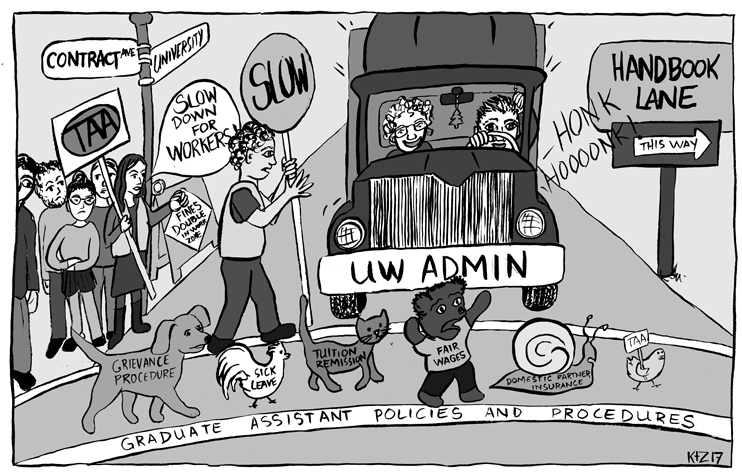Graduate Policy and Procedures Update Bulletin: TAA Wins Inclusion in Contract-to-Handbook Transition

TAA Achieves Four Committee Positions After Year-Long Effort
The Teaching Assistants’ Association (TAA) has recorded several victories in its year-long effort working with the University of Wisconsin-Madison administration on the process of converting the graduate student worker contract into a policies and procedures document. The TAA has pushed the university to be more transparent in its work of modifying employees’ working conditions. Due to its organizing efforts, the TAA has been recognized as a stakeholder in the charter governing the transition workgroup overseeing this process. Four TAA members will sit on the committee, which will hold its first open meeting tomorrow, June 20 from 1-2:30 in 334 Bascom Hall. The members are Carl Sack, Sergio Gonzalez, Megan Maguire, and Aaron Batker Pritzker. Come join us and make your voices heard!
Why This Matters
Since the passage of Act 10 in 2011, which severely rolled back the rights of public sector unions in Wisconsin, UW–Madison has honored the 2009 employment contract the TAA negotiated. The conversion of a contract to a set of policies and procedures means the policies guiding working conditions – grievance procedures, employee leave, etc – are subject to change. Therefore, the TAA’s role on this committee, with its expertise in the contract and the state of graduate working conditions, will be to protect our hard-won workplace rights as well as advocate for improvements.The TAA, the oldest graduate employee union in the country, has fought for for over 50 years on this campus to win and protect graduate employee rights, and we will continue to do so.
Background: Membership Action and ASM Solidarity Lead to Key Victories
The TAA has been working with the Office of Human Resources and the Vice Chancellor of Finance and Administration to come up with a committee structure that ensures graduate employees have a say in changes to their own working conditions.
Initial TAA demands focused on making the process as transparent as possible, which was especially important because of the far-reaching impact of these decisions, and Human Resources was amenable to many suggestions for the contract-to-handbook committee, including making meetings public, recording all votes, and working towards a consensus process. However, the initial charter for the committee overseeing this transition did not name the TAA as a stakeholder, as a group to be communicated with, and did not grant the TAA a committee seat.
In response, the TAA launched a campaign asking members of the campus community—graduate employees, staff, professors, alumni, and undergraduates—to write cards urging the administration to appoint the TAA as the body to represent graduate workers on the committee. The purpose of this campaign was two-fold: to let people know about the issue and to demonstrate the TAA’s broad support. A delegation of twenty-five members delivered hundreds of cards to the Vice Chancellor’s office.
Additionally, the TAA worked with the Associated Students of Madison (ASM), the university’s student governance body, to change their bylaws to relay all graduate employment matters to the TAA. The initial charter left all graduate assistant seats on the committee to be appointed by ASM, which has never had the responsibility of deciding graduate employment issues. Because of the TAA’s 50-year history of representing the interests of graduate employees, it is best positioned to speak to these issues, and its initial exclusion was problematic. We commend ASM for recognizing this and will continue to support their work on student issues.
What’s Next
Despite these victories, questions remain about the effort to convert the contract to a handbook, and how to keep the concerns of graduate student workers front and center in the process. Specifically, in breaking a 50-year tradition of the TAA being the representative body for graduate employees, the TAA sees a new resistance by university administration towards graduate workers organizing in their own interests.
By working through ASM, the administration makes evident their interest in treating graduate employment in the realm of student issues. For those who are aware of the graduate worker labor movement, this is a national issue. The TAA began organizing in 1966 and in 1969 forced the administration to start bargaining a contract — the first official recognition of grad students as employees in the country leading the way for unionizing grad employees at public universities. In 2016, the National Labor Relations Board ruled that graduate employees at private universities are indeed workers with the right to unionize. Now the oldest graduate worker labor union in the country is fighting for that kind of recognition: that we are not just students, but employees who provide essential labor to this university.
We are excited to have four TAA members serve on this committee, but more work will need to be done to ensure an end result that is beneficial for all graduate workers on campus. The TAA encourages all graduates to participate in the upcoming public meetings. The first public meeting is tomorrow, June 20 from 1-2:30 in 334 Bascom Hall, and we will update you when we know the schedule for future committee meetings.
The university works because we do.

